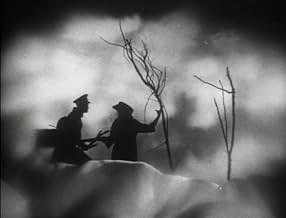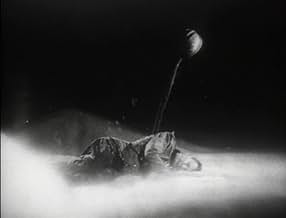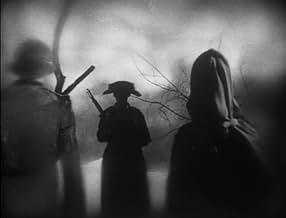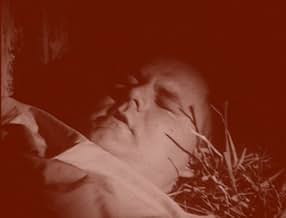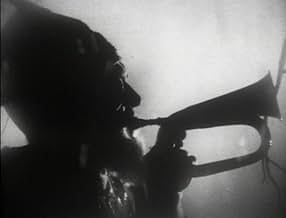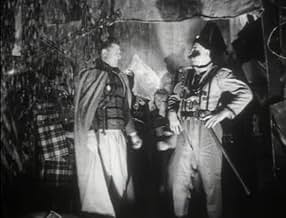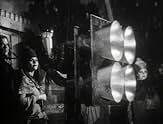Ajouter une intrigue dans votre langueAn amnesiac soldier, seeking his lost love, arrives in Archangel in northern Russia to help the townsfolk in their fight against the Bolsheviks, all quite unaware that the Great War ended th... Tout lireAn amnesiac soldier, seeking his lost love, arrives in Archangel in northern Russia to help the townsfolk in their fight against the Bolsheviks, all quite unaware that the Great War ended three months ago.An amnesiac soldier, seeking his lost love, arrives in Archangel in northern Russia to help the townsfolk in their fight against the Bolsheviks, all quite unaware that the Great War ended three months ago.
- Réalisation
- Scénario
- Casting principal
- Récompenses
- 1 victoire au total
- Stage Kaiser Wilhelm II
- (as Snyder)
- Baby
- (as Graham Blicq)
Avis à la une
Like all of Maddin's other films, Boles is and anti-hero, his subversive obsession with Veronika could not be interpreted as love or heroic, a brillliant deconstruction of your average war movie.
The ending is a bit disappointing (out of the brooding character with the rest of the film) but in all a great film.
We have a typical Guy Maddin story (B/W) based in 1919 about an amnesiac soldier named John Boles (no big names in this film) who sets out to find his true love, Iris, in Archangel, Russia where the Great War has already ended three months prior, but they have not received word about it yet. Obviously, the whole thing can be looked at as a gag; people wasting their time, dying (perhaps) when they shouldn't be. A lot of elements stuck out to me during this story that makes me believe that YOU CAN WATCH THIS FILM A MILLION TIMES AND NEVER, EVER, EVER, EVER GET BORED.
Let us start right off the bat and mention that this film was VERY EISENSTEIN- ESQUE. Definitely not a bad thing; we all love IVAN THE TERRIBLE, but for some amount of individuals, it is just not their cup of cameo-mocha tea. The things I find similar are the CINEMATOGRAPHY; very old fashioned just as Eisenstein had it in the 40s and 50s // then there is the SET DESIGN, which is the biggest in my opinion, because, as complex as the movie may seem, it was such a simple development and everything (costumes and all) ran smoothly (nothing seems too quirky or fake). He really gave a sense of direction regardless of how amateur the locations seem.
**Speaking of Eisenstein's Ivan the Terrible: Part II, ARCHANGEL used a similar effect towards the end to give the audience a sense of direction from one place to another; one, red tint // one, blue tint. Very beautiful.
I rated Guy Maddin's Twilight Nymphs (pretty low, in fact) and couldn't help but feel betrayed by him. Now after seeing this project, I want to RE-WATCH that film until I can find the greatness in it. THE MADDINESS!! if you will..
***But like other Maddin films, this one has the same style of dialogue. That means, unnecessary laughs and confusion all around the audience. BUT I LOVE IT. Like I said, this movie you can see numerous times and always get a different out-look on it. Some things you might take to heart, but others you might find are actually part of the story and fit very well // however quirky or surreal they may seem. My favorite line comes from Iris's second lover, Philbin, when he says:
+ PHILBIN: I believe there is a reason for everything. For instance, someone shaved my mustache while I slept last night. What could that mean? +
I think this film is very easy to understand, even for a baby.. okay, maybe not really, but some might thinks there's too much going on. BE PATIENT, the story will come to you. Besides, there is written text shown to update you every once in a while of what it happening in the scenes.
*****There is a scene with someones intestines that I REALLY want to bring up, but I do not want to contain any spoilers in my reviews. **If you watch this film or have already embarked upon it, then you will know what I am talking about; Hehe.
I hereby rate thee film a 10 OUT OF 10!!! I know, many will concur, but film for me is a serious art form. While some things out their are being made with no effort, money wasted, and DREAMS CRUSHED.. it is works like this that can really make you take a second and actually appreciate LOVE, FRIENDSHIP, POSSESSIONS, or even COURAGE/BRAVEY; claiming your part in the world. And I got all of that from Guy Maddin's Archangel. - Heart-on!
-- Michael Mendez
Filming entirely indoors with homemade props and costumes, director Guy Maddin has created a very strange and intense movie. Cribbing heavily from the look and atmosphere of German expressionist cinema, Maddin goes much further in exploring some very human issues: loss, love, memory and redemption. He also examines patriotism and by stylistically depicting the horrors of trench warfare he delivers a pacifist message that reminds me of movies like Grande Illusion and All Quiet on the Western Front. The ultimate power of this movie, however, lies in the sense of alienation we see among the characters. They are not only unable to love each other, they are barely able to communicate. In fact, under the cloud of forgetfulness that is a major theme in this movie, the characters are often not even capable of recognizing one another at all!
I'm really beginning a deep appreciation of this man's visual soul. While this project didn't change my life, it demonstrated the power to do so, like a strutting policeman among weak minds.
What I like about his mind is how he seats the thing first in the soul, then in the cinematic vocabulary instead of the usual path which values character, motivations, narrative clarity. What he's done here is revisit Eisenstein. I don't suppose many filmgoers have much truck for a Russian silent filmmaker who was primarily occupied in Soviet propaganda. He developed some important ideas about how a scene (never a movie only a scene) can be constructed from visual fragments what it means to "see."
His particular solutions aren't popular today, and the whole idea of slicing the eye has been appropriated to the service of now-conventional values of storytelling and the cult of celebrity some few jokes and even fewer emotions destinations.
Eisenstein's idea is based on the notion of readable cells of retinal comprehension, more or less of the same size which when combined give an impression. The more discrete the components in presentation the more comprehensible the assembly, what he called the collage.
What Maddin does here is make a metaEisenstein. The story is set in Russia and populated by international warriors, all of whom have only a groggy notion of why they are there. Our hero, like Maddin, is Canadian. It is essentially a silent movie. There is a parallel movie that is a talkie, into which this silent, main piece is embedded.
Within the silent movie is a sort of "movie within," exactly as abstract from the silent portion as the silent portion is to the talkie portion and thence not to our world (as is the usual case with folding) but to the world of normal movies.
That "movie within" is the "illumination" a set of stage tableaux depicting famous battles. If you experience nothing but these or rather if you skate over all the surrounding context and focus only on these you will be rewarded. There's so much reference there.
The overall theme of the thing is the hard boundary of memory, where the continuity of knowing begins and ends. In the story, this exhibits as amnesia plus a sort of quantum identity shifts of women, who else? That's good, its valuable. But the interesting thing is how this is seated in the collage itself. Eisenstein's idea is that each cell, each image, of the collage needs to have some reference to the others. The art is in the nature of that reference.
Maddin makes that reference sit on the cells. In his case they are not bubbles in transparent foam that light can shine through. Instead they are stones, smooth stones with hard impenetrable skins that only know themselves and keep forgetting those they are nestled against. So they forget who they are.
Ted's Evaluation -- 3 of 3: Worth watching.
Le saviez-vous
- AnecdotesThe interiors of the hotel where Philbin and Veronkha stay were in fact the director's apartment, redressed and with an elaborate new paint job.
- Citations
Danchuk: I've heard of ghosts. Good ghosts who wonder the battlefields at night, guiding soldiers out of danger. You can see their omens everywhere. Omens, warnings of stray bullets and lurking enemies. If I was such a ghost, I would stay so close to you, you could feel my breath on your cheek.
- ConnexionsFeatured in Guy Maddin: En attendant le crépuscule (1997)
Meilleurs choix
- How long is Archangel?Alimenté par Alexa
Détails
Box-office
- Budget
- 500 000 $CA (estimé)
- Durée1 heure 18 minutes
- Couleur
- Mixage
- Rapport de forme
- 1.33 : 1
Contribuer à cette page


